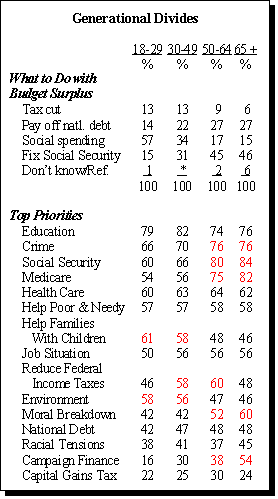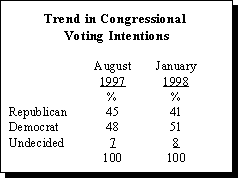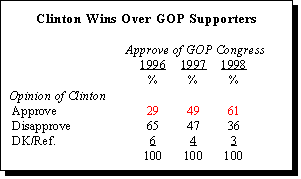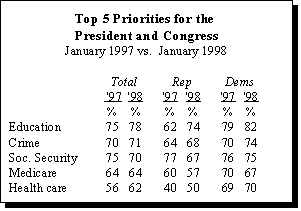Survey Findings
In 1997, Americans were happier with their own lives, felt more religious conviction and were less attentive to the news than at any time in recent years.
 Fully 47% of Americans say that they are highly contented with their lives today, a jump of 10% points in just the last year and 9% points higher than at any time in the past 30 years.1 Another significant change in long term trends shows nearly three quarters of Americans now say they “completely agree” with the statement: I never doubt the existence of God. This represents an 11% point increase over the past decade.
Fully 47% of Americans say that they are highly contented with their lives today, a jump of 10% points in just the last year and 9% points higher than at any time in the past 30 years.1 Another significant change in long term trends shows nearly three quarters of Americans now say they “completely agree” with the statement: I never doubt the existence of God. This represents an 11% point increase over the past decade.
Yet the public’s interest in news continues to fall. On average from 1986 through 1996, 25% of the public followed major news stories tracked by the Pew Research Center “very closely.” This year, that number fell to 19%. For the second time in the 1990s, only one story united most Americans.
The one story that garnered the “very close” attention of more than half of the public was the death of Britain’s Princess Diana. Fully 54% of the American public paid very close attention to news accounts of the Paris tunnel crash that killed the Princess followed by her funeral September 6. No other story this year was close. (See chart next page.)
News out of Washington fared particularly badly. For the second consecutive year, not one domestic policy story made the annual list of top 10 news stories. This year, just 49% of the public paid very or even “fairly” close attention to stories on domestic policy compared to 62% in 1993.
 Only two Washington-based domestic stories were followed very closely by as much as a quarter of the public this year: the January debate over various Social Security reform proposals (29%) and the fall discussion of IRS reform (25%). Adding those who followed news at least fairly closely, a majority of Americans kept up with just five Washington-based stories this year.
Only two Washington-based domestic stories were followed very closely by as much as a quarter of the public this year: the January debate over various Social Security reform proposals (29%) and the fall discussion of IRS reform (25%). Adding those who followed news at least fairly closely, a majority of Americans kept up with just five Washington-based stories this year.
Even the drumbeat of scandal failed to arouse much interest. At the height of public interest, the Senate hearings into allegations of campaign finance irregularities by the Democrats drew the very close attention of just 19% of Americans. Heavy news coverage of the hearings did not harm President Clinton’s popularity. For the first time, his approval ratings stayed comfortably above the 50% mark all year.
Baghdad and Bad Beef
 The year’s No. 2 story was the dispute with Iraq over the role of Americans on United Nations weapons inspection teams in November. The story was followed very closely by 44% of the public. Interest in this story roughly matched the average of 41% who very closely followed stories about military interventions in past years.
The year’s No. 2 story was the dispute with Iraq over the role of Americans on United Nations weapons inspection teams in November. The story was followed very closely by 44% of the public. Interest in this story roughly matched the average of 41% who very closely followed stories about military interventions in past years.
Two consumer stories made the top ten list: the recall of tainted hamburger meat (at No. 3 with 40%) and the end of the UPS strike, which interrupted deliveries coast-to-coast (No. 5, 36%).
Crime is featured high on the list. Timothy McVeigh’s trial on Oklahoma City bombing charges ranked No. 4 with 39% following the story very closely in June, followed by the O.J. Simpson civil trial and verdict (No. 8, 30%) and the British au pair trial in Massachusetts (No. 9, 30%).
Disasters also drew widespread attention. The winter floods in the Pacific Northwest were followed very closely by 34%, ranking it No. 6, followed immediately by the Heaven’s Gate cult mass suicide (32%).
Finally, the birth of McCaughey septuplets drew the very close attention of 29% of the public last month, ranking the story No. 10 for the year.
The top three stories of the year had significant gender gaps in news interest. Far more women than men followed news about Princess Diana’s death (64% to 43%) and the recall of hamburger meat (46% to 34%). More men followed news of tensions in Iraq (51% to 37%). The story about the septuplets also had a large gender gap: 36% of women followed the story very closely compared to 21% of men.
Although the debate about Social Security involved benefits for today’s young people, it was seniors, not Generation Xers, that followed the news. Only 16% of those under 30 followed the story very closely, compared to 50% of those 65 and older.
The stories included in Pew surveys this year that drew the least attention were all based abroad: the civil war in Zaire (followed very closely by 4% of the public), NATO expansion (5%), the British Labor Party victory (5%) and the Helsinki Summit with Presidents Clinton and Yeltsin (6%).
I Believe in Miracles
 Angels emerged as a leitmotif this year as strong religious faith soared. While Americans are said to be more cynical than ever, a series of questions about Americans’ faith in God, the role of prayer in their lives and belief in miracles all show substantial increases in nearly every demographic group over the past decade. Fully 61% of the public completely agree with the statement: Even today miracles are performed by the power of God. This is up 14% points since 1987.
Angels emerged as a leitmotif this year as strong religious faith soared. While Americans are said to be more cynical than ever, a series of questions about Americans’ faith in God, the role of prayer in their lives and belief in miracles all show substantial increases in nearly every demographic group over the past decade. Fully 61% of the public completely agree with the statement: Even today miracles are performed by the power of God. This is up 14% points since 1987.


